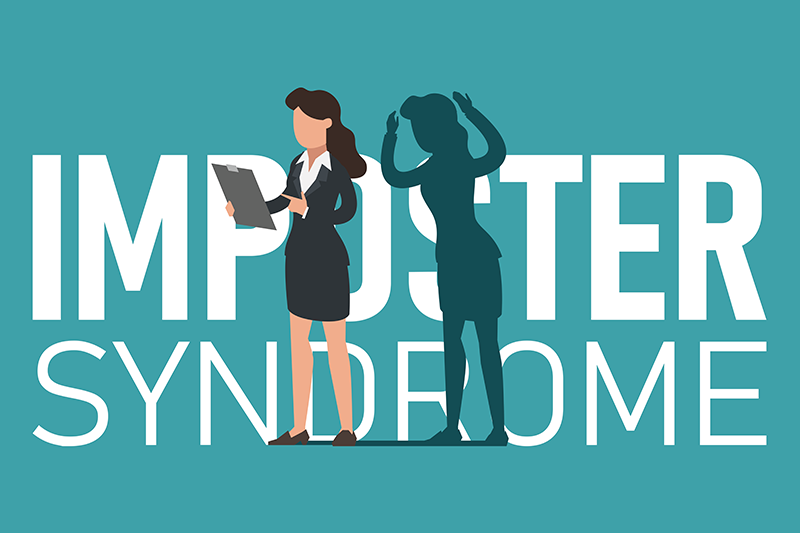
"I don't belong here."
"It's only a matter of time before everyone finds out I don't know what I'm doing."
"I'm just lucky."
Do any of these sound familiar? Then you're ready to get clued in on a little secret. Many entrepreneurs, just like you, share a feeling deep down that they're complete frauds who just so happened to be in the right place at the right time.
You probably know this feeling — it's the sense of doubt or unworthiness as you navigate your career. We've all been there. But when your success is a result of your own hard work and you still feel inadequate, there's a good chance you're battling impostor syndrome.
At its simplest, imposter syndrome means you feel like a fraud in your field. You believe your achievements are a result of sheer luck, not your blood, sweat, and tears. You might feel like you don't deserve any of the major milestones or accomplishments you've achieved. And you might worry that you've somehow tricked people into thinking you're good at what you do, and you live in fear of being "found out."
In short, imposter syndrome is a mess of negative emotions. And it might be holding you back from achieving your true potential as a small business owner.
But before you start consulting Dr. Google for answers, know that impostor syndrome is super common. According to research, up to 82% of people have suffered from it.
Here's some good news: Even though this feeling is all too common, especially among small business owners and entrepreneurs, many still go on to build hugely successful businesses. How? By acknowledging their doubts and powering through them.
That's why we're giving you five tips to overcome imposter syndrome so you can spend more time celebrating what you actually are — a total boss.
Here's How To Crush Imposter Syndrome Once and For All
Step 1: Get real with yourself
It's easy to overlook the signs of imposter syndrome, especially when you're deep in the process of getting your small business off the ground. You might keep yourself busy to drown out that nagging self-doubt. Or maybe you laugh it off with your friends after a particularly challenging day.
Whatever your vice, it's important to get real with yourself. If you're having trouble distinguishing the difference between the occasional uncertainty and imposter syndrome, consider walking through these top signs.
You struggle with accepting praise or think people overvalue your success
You feel like you don't deserve your achievements or attribute your success to pure dumb luck
You hold yourself to impossibly high standards
You find the fear of failure paralyzing
You think you've tricked other people into thinking you're smarter or more experienced than you actually are
You worry you're just not good enough
If the shoe fits, don't freak out. You just took the first step towards taking down imposter syndrome (that's a total boss move, by the way).
Step 2: Figure out what kind of imposter syndrome you have
It's time for a little more introspection (then we'll get on to actual steps on how to handle these emotions, we promise).
Did you know that there are different types of imposter syndrome? Knowing what category you fall into can help you problem-solve accordingly. Here are the five types to consider.
The Perfectionist
You set extremely high expectations for yourself. When you hit 99.9% of your goals, you still feel like a failure. Did you make a small mistake while filing paperwork for your business? It probably made you question your entire existence as an entrepreneur. You might be The Perfectionist if you miss an insanely high goal (like monthly sales goals, for example) and accuse yourself of not being cut out for the job.
The Expert
You need to know everything that can possibly be known on a subject, and you're always looking to improve your skills with new entrepreneurial classes or certifications. You might be The Expert if you feel like you still don't know "enough" (despite doing a ton of research on starting a business), or you have a huge fear of appearing "stupid" if you don't know the answer to something.
The Natural Genius
If a particular task took longer than expected, like building your company website, your first instinct is to assume you're just not good enough. You're used to being really good at things, so when you have to put in extra effort, you suddenly feel like an imposter. You might be The Natural Genius if your confidence takes a hit when faced with a setback or if you avoid challenges because it's uncomfortable to try something you're not immediately great at.
The Soloist
You like to accomplish tasks on your own. You might be The Soloist if you refuse to ask others because of a fear that it'll make you look like a failure or a fraud.
The Superhero
You work harder and later than your peers to prove that you're not an imposter. You might be The Superhero if you feel like you haven't truly earned your title, and as a result, you feel pressured to put in extra work just to prove yourself.
Step 3: Understand that you are not alone
Here's some positive news: Hugely successful people have built amazing careers while struggling with imposter syndrome.
Thousands of other entrepreneurs are going through the exact same thing. If they can push their imposter syndrome aside and focus on becoming a total boss in their field, you can, too.
In her book "Lean In: Women, Work, and the Will to Lead," Facebook COO Sheryl Sandberg said, "Every time I was called on in class, I was sure that I was about to embarrass myself. Every time I took a test, I was sure that it had gone badly. And every time I didn't embarrass myself — or even excelled — I believed that I had fooled everyone yet again."
Mike Cannon-Brookes, the billionaire co-founder of software company Atlassian, is an incredibly successful person by any definition of the word. In a 2017 Ted Talk, he discussed his own ongoing imposter syndrome.
"Most days, I still feel like I don't know what I'm doing," Cannon-Brookes said. "It doesn't go away with any form of success. I had assumed that successful people don't feel like frauds. I now know the opposite to be true."
Step 4: Go easy on yourself.
Things can be a little easier if you're honest with yourself. You're not the expert in everything, but you are the expert in a lot of things.
That's because impostor syndrome usually manifests as negative self-talk, that little voice in your head saying, "you're not smart enough." This kind of headspace has a huge influence on our stress levels, and once it starts, it's easy to let it take over.
"Going easy on yourself" can mean a lot of things. Here, it simply means shifting your negative thoughts by practicing positive self-talk. You'll find that this exercise can reduce your anxiety and help you build the confidence to keep moving forward.
Here's how to do it: First, try to identify any negative thought that's taking up space. Then, flip that thought on its head by questioning why it's there in the first place. For example, if you tell yourself, "I was just in the right time and place" after seeing a spike in sales or an uptick in your website's traffic, challenge that idea by instead thinking, "What steps did I take to see those results?"
Try answering your own question using affirmations (short, positive statements about yourself). Here, it might be as simple as telling yourself, "I worked my butt off to build a strong marketing strategy for my business."
Step 5: Track and celebrate your wins.
When you feel like an impostor, you struggle to understand that you played the most prominent role in your success. You might credit your success to luck or someone else's hard work, but in reality, you had everything to do with it.
To help show yourself that you're actually doing a great job, keep track of your wins. As a small business owner, these wins can manifest in many ways. No victory is too small or unworthy of celebrating.
Was your goal to boost awareness for your small business? When you see that your Facebook Business Page followers increased by 40% during the last quarter, celebrate it. You devised and executed a strong social media strategy, and you earned every single one of those new followers.
Was your goal to get 50 new clients this year? When your client roster nearly doubles, celebrate it. You honed your expertise and created a service that fulfills an unmet need, and that makes you a total boss in your industry.
If you ever feel self-doubt, take a moment to look back at those wins and pat yourself on the back. You accomplished all of those things because of pure hard work and skill.
Step 6: Be OK with failure.
Let's face it — being your own boss and a small business owner is hard. You will make mistakes. You will have bad ideas. And you'll most definitely need to scrap one or two of your plans because, well, they just didn't work out.
But what if these failures — losing a client, seeing a new product release flop, having a slow month of sales — weren't positioned as bad things? Instead, what if you started looking at them as lessons in humility — signs that you're not going to succeed at everything?
For starters, that mindset would lighten the load a LOT. When you ditch the idea of perfectionism, suddenly, messing up isn't so scary. More importantly, failure can teach you a thing or two.
Everything leading up to failure is a lesson. You can get bogged down in self-doubt, or you can choose to learn and grow from it. If you accept failure, you can assess what happened and learn from it.
Being a boss and entrepreneur is all about taking on new challenges and exploring new ways to build the best business you can dream up — even if it means failing from time to time. In the end, you'll be a bigger, badder boss than when you started.
---
While you're out there slaying your business goals, remember that you don't always have to do everything on your own. As you continue to build your dream business, the experts at Swyft Filings can help take the complexity out of things like officially forming your LLC. That means one less thing to worry about and more time to keep being awesome.

